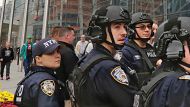Washington: The legal wrangling has started. Less than a week before the US presidential election, the parties are running up to the courts amid claims "all hell would break loose" if Hillary Clinton emerges as the winner after a tight result.
The Democratic Party has struck pre-emptively to head off threatened Republican voter intimidation on Tuesday, applying to a New Jersey court for the Republican Party to be ordered to abide by a 1982, court-approved agreement under which the Republican National Committee (RNC) pledged not to intimidate voters going to the polls.
More News Videos
US militia prepares for post-election trouble
Rifle practice and hand-to-hand combat training for a militia group in Jackson, Georgia, in anticipation of possible unrest in the wake of the US election.
Stop right there and think about that: they actually have to have a deal on the books to prevent intimidation of citizens exercising a democratic right.
US District Judge John Michael Vazquez ordered the RNC to give Democratic leaders – before Wednesday – any evidence of deals with the Donald Trump campaign for his supporters to stand watch at polling places, as publicly demanded by Trump and some of his surrogates.
Sitting in Newark, Vazquez also ordered the Trump campaign to provide affidavits to explain recent remarks about ballot integrity and poll watching by both campaign manager Kellyanne Conway and vice-presidential running mate Mike Pence – and in particular, which precincts they believed should be monitored and why.
Democratic National Committee (DNC) lawyer Rajiv Parikh told the court: "Trump has falsely and repeatedly told his supporters that the November 8 election will be 'rigged' based upon fabricated claims of voter fraud in 'certain areas' or 'certain sections' of key states … unsurprisingly, those 'certain areas' are exclusively communities in which large minority voting populations reside."
Vazquez stopped short of issuing the temporary restraining order requested by the DNC. Instead, he ordered the parties back to court on Friday, when he would consider a final ruling on whether the Trump campaign's conduct amounted to a violation of the 1982 agreement.
The DNC application applies to voting in Pennsylvania, Ohio, Nevada and Arizona – all swing states.

In the hearing, Parikh produced anecdotal evidence from Las Vegas where, during early voting, a Trump supporter who previously had been ordered to stay away from polling stations had fronted at a shopping centre where he is said to have yelled at voters, accused voters and poll workers of breaking the law, and given voters incorrect information.
Trump surrogate Roger Stone - who reportedly was complicit in the GOP activity that prompted the 1982 agreement - has set up Stop the Steal, a group he says will be conducting "neutral" surveys at 7000 key precincts with a view to confirming the accuracy of machine voting.

"We seek only to determine if the election is honestly and fairly conducted and to provide an evidentiary basis for a challenge to the election if that is not the case," Stone said in a statement.
Such comments and particularly Trump's reticence on committing to accept the outcome of the election are causing alarm about how events might unfold in the aftermath of a tight or uncertain result.

In the 2000 election the prospect of protracted legal wrangling in the wake of Florida's questionable "hanging chad" vote, was defused when Democratic candidate Al Gore responded to a Supreme Court order for the suspension of a recount he had requested with what was considered a gracious speech – in it he said: "For the sake of our unity as a people and the strength of our democracy, I offer my concession".
Writing in USA Today, election expert Michael McDonald warns that Gore's conciliatory tone is not a part of the "rigged" rhetoric that Trump uses to whip up supporters at his rallies.

"He talks of people casting fraudulent votes and stationing observers to 'watch' the election. Trump questions the process itself, describing how election officials count ballots: 'Oh, here's a ballot. Here's another ballot, throw it away. Oh, here's one I like. We'll keep that one'," he says.
McDonald argues that it's quite conceivable that late counting of provisional and postal votes, which traditionally lean Democratic, could help Clinton to overtake an early Trump lead in the counting.

Pointing to the impact on the count of hundreds of thousands of provisional votes – he says there were 200,000 in Ohio alone in 2012 – McDonald sets out a scenario that might unfold:
"Now imagine Trump has a slight initial lead in Ohio, and this state puts him over the 270 electoral votes he needs to win.

"Trump might declare himself the president-elect and attack the 'dishonest media' for failing to anoint him. As election results shift in Clinton's direction, as would be expected given the character of the ballots counted late, he would rail at Republican Ohio Secretary of State Jon Husted - who has endorsed Trump - as fixing the election for Clinton.
"If Clinton eventually emerged the winner, then all hell would break loose."

Friday's return to the Newark court is not the only legal date in Trump's diary – receiving little attention in the wall-to-wall reporting on Trump's treatment of women is the order by a federal judge that lawyers for Donald Trump and disgraced financier Jeffrey Epstein appear in a New York court on December 16, for a status conference on allegations by a woman known only as "Jane Doe" who alleges Trump raped her when she was 13.
Denouncing the woman's civil action as a bid to smear him, Trump said the accusations as fabrications. Epstein, who was convicted of underage sex crimes in Florida in 2008, also denied the allegations.
Earlier this year, The Guardian reported the lawsuit appeared to have been coordinated by a former producer on the Jerry Springer TV show who has been associated in the past with a range of disputed claims involving celebrities including OJ Simpson and Kurt Cobain and that a publicist acting for "Jane Doe" had attempted to sell a video in which the woman describes her allegations against Trump to media outlets at a $US1-million ($1.3-million) price tag.
The original federal lawsuit, filed in June, alleged that "Jane Doe" was sexually assaulted by Trump in 1994 at Epstein's Manhattan home, and that he had raped her at parties hosted by Epstein on the Upper East Side of New York.










145 comments
Comment are now closed